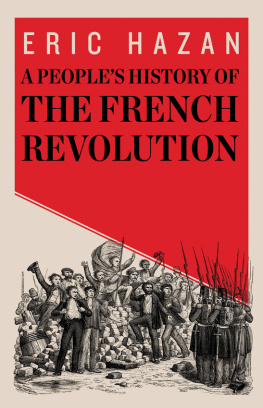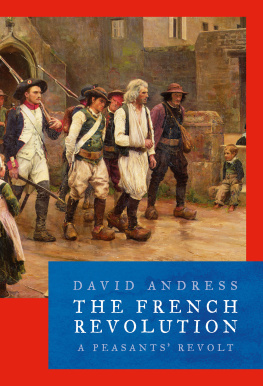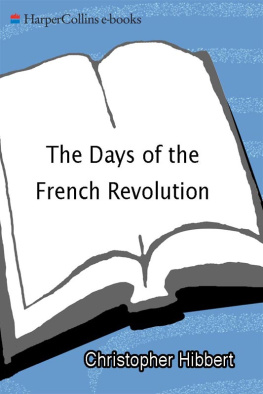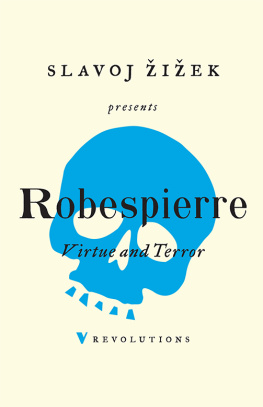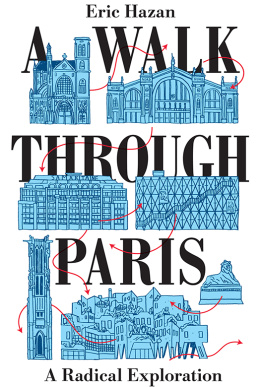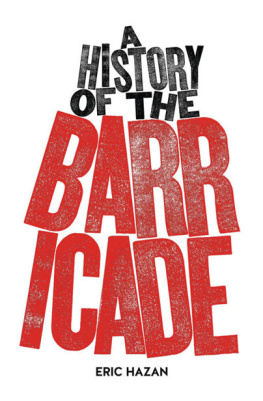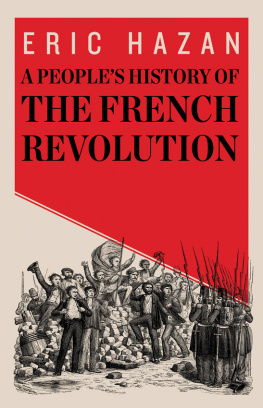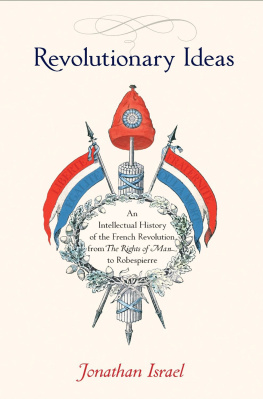A PEOPLES HISTORY OF
THE FRENCH REVOLUTION
Eric Hazan
Translated by David Fernbach


Ouvrage publi avec le concours du Ministre franais charg de la culture Centre national du livre
This work was published with the help of the French Ministry of Culture Centre national du livre
This English-language edition published by Verso 2014
David Fernbach 2014
First published as Une histoire de la Rvolution franaise
La fabrique ditions 2012
All rights reserved
The moral rights of the author have been asserted
1 3 5 7 9 10 8 6 4 2
Verso
UK: 6 Meard Street, London W1F 0EG
US: 20 Jay Street, Suite 1010, Brooklyn, NY 11201
www.versobooks.com
Verso is the imprint of New Left Books
ISBN-13: 978-1-78168-589-1 (HB)
eISBN-13: 978-1-78168-590-7 (US)
eISBN-13: 978-1-78168-675-1 (UK)
British Library Cataloguing in Publication Data
A catalogue record for this book is available from the British Library
Library of Congress Cataloging-in-Publication Data
Hazan, ric.
[Histoire de la Rvolution franaise. English]
A peoples history of the French Revolution / Eric Hazan ; translated by David Fernbach. English
edition.
pages cm
Includes bibliographical references and index.
ISBN 978-1-78168-589-1 (hardback : alk. paper) ISBN 978-1-78168-590-7 (ebook)
1. FranceHistoryRevolution, 1789-1799. I. Fernbach, David, translator. II. Title.
DC148.H2913 2014
944.04dc23
2014013303
Typeset in Adobe Garamond by Hewer Text UK Ltd, Edinburgh, Scotland
Printed in the US by Maple Press
Contents
U p till now I have always avoided that particular exercise in writing known as a preface, foreword or introduction, but this time, for a subject like the French Revolution, a few explanations are necessary.
As to the reasons that impelled me to such an undertaking: this was originally intended as a short book for friends of mine, especially the younger ones, who have only a vague memory of the Revolution from school, a confusing mixture of blood and boredom. But I soon realized that a short book would not have conveyed the voices of its leading figures, or addressed the more complicated questions, in a way that might arouse such readers interest and hopefully their enthusiasm. Space was needed, a good deal of it.
Once I had reframed my project accordingly, however, another question arose: was an autodidact like myself capable of this larger and more ambitious work? Could I follow in the footsteps of Michelet, Jaurs or Mathiez, not to say of lesser historians, without inviting ridicule? And now that the book is finished, I still dont know the answer.
What I have tried to do, at all events, is present a narrative of the French Revolution: the fourteen chapters follow one another chronologically without digressions, something that has not always been easy, as revolutionary time is prone to sudden accelerations when events pile up one on top of the other, and a certain amount of artifice is needed to present them in some kind of order. The narrative form is a montage that tightly links the two great revolutionary stages, that of the elected assemblies and that of the people high eloquence and the rumbling that acts as its basso continuo, and becomes so powerful at times that nothing else is heard.
I have tried not to show the Revolution as a chiefly Parisian phenomenon. We see the people of Strasbourg storming their city hall, Marseille patriots rebelling against Parisian domination, workers of Lyon, peasants burning chteaux, requisitioning barges of grain and punishing hoarders. And even on the Paris scene, we see people from the provinces send delegations and messages to the Assembly, indicating that they understand the issues involved and share in their risks.
The book does not maintain a single focal length. I have passed quickly over the most famous episodes and slowed down on the problematic moments, without drawing conclusions or summarily judging between possible interpretations. In the case of certain events and individuals, I have paused for a time in a kind of extended parenthesis or excursus, so as to freely offer my personal interpretation.
I have avoided any reference to the twentieth century, the Bolshevik Revolution and the various totalitarianisms. The French Revolution is not the matrix of anything else, and readers are sufficiently grown-up to make the connections without every t having to be crossed. Similarly, I have not discussed in detail the debates among historians an interesting subject, but one for another book.
As readers will see, this work contains a large number of direct quotations. There are two reasons for this. The first is that, on consulting the sources, it turns out that the most famous speakers sometimes said something different from what is generally attributed to them. The second is that in the time of the Revolution language was a thing of great beauty, poised between irony and effusion, harshness and tears. There seemed no point in citing such speeches indirectly, when the words actually pronounced had a poetic force thats quite rare in politics.
Finally, though I have done my utmost to remain faithful to what are called the facts, I do not claim that this book is objective. I hope on the contrary that it will stoke a flare of revolutionary enthusiasm, at a time when the prevailing tendency is more towards relativism and derision. In the words of Saint-Just: Unhappy are those who live in a time when persuasion is a matter of smartness of wit.
ACKNOWLEDGEMENTS
T hanks first of all to my scholarly friends Florence Gauthier and Yannick Bosc, who had the patience to read and comment on my manuscript. Their expert criticisms and suggestions were a great help in giving this book its final form. My daughter, Karine Parrot, read it in a faux-nave fashion, which helped me avoid being awkward, obscure or obvious in several places. Many thanks also to Alain Badiou and Jean-Christophe Bailly for their advice, to Sebastian Budgen for the recondite references he pointed out to me, to Patrick Charbonneau for the Hlderlin poem, and finally to Sabrina and Clo who put up with me throughout this long work.
The king, he said, was the most generous of princes, but his generosity could neither relieve nor reward everyone, and it was only his misfortune to be amongst the number.
Laurence Sterne, A Sentimental Journey through France and Italy
A needless revolution?
W hatever the title we give it, this first chapter is very far from being merely a backdrop set up before the start of the action: what is at stake here is a choice between two contrasting views of the French Revolution. For a whole lineage of historians stretching from Tocqueville to Furet, the substance of what is generally seen as the revolutionary upheaval was already under way, if not completed, by the end of the Ancien Rgime. An American-style revolution, calm and democratic, would have led to the same end result, while avoiding sound, fury, and the guillotine: The Revolution finished off suddenly by a convulsive and painful effort, without a period of transition, throwing caution aside and without any consideration, what would have automatically been finished gradually and by slow degrees.

